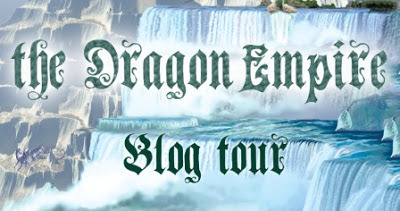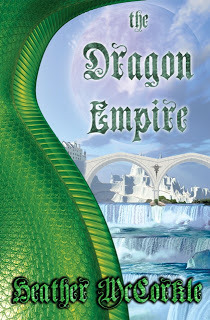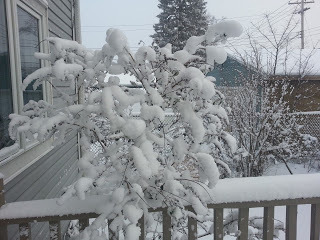Michelle Hauck's Blog, page 143
February 7, 2013
Happy Release Day to Heather McCorkle

Today we're celebrating the release of Heather McCorkle's fantasy novel, The Dragon Empire! For today's stop Heather is answering the following question:
Are the dragons in your book shapeshifter?
Heather: No. While they can take other forms it is only with the use of magic, only temporary, and not all of them can do it. I figured there are enough great shapeshifter stories out there and not enough stories about just dragons, so my dragons are 'all' dragon. :)

B&N / Amazon / Goodreads
Here is a bit about it:On Yacrana dragons are the advanced species. But advanced doesn't always mean civilized...
There's trouble in the Dragon Empire, the kind that could start a war between dragons and the races of people. Hidden factions of dragons believe they should rule the lesser races, not simply stand aside and allow them to develop as they will. Having lived so long in peace, the Emperors turn a blind eye, many oblivious that such attitudes even exist.
Despite being only an architect class, emerald dragon, Grendar is willing to risk banishment and death to stop that which his rulers refuse to see. The hope of peace lies not within the scaled breast of a dragon however, but within the hands of a group of people. But if the hidden factions have their way, these people won’t live to fulfill such a destiny. With a reluctant seer at his side, Grendar must leave his precious Empire for the outside world to save those that will one day save his kind.
While The Dragon Empire is for ages young adult and up, it does contain mild violence and some difficult subject matter.
Published on February 07, 2013 12:39
February 5, 2013
Getting the Call: Rhiann Wynn-Nolet
Wake up, writers. February may be dreary, but I have a solution--a dash of inspiration. Sometimes the rejections pile up and the going gets hard. Everyone needs a reminder to stay strong because you really never know what's around the corner. So look out, Cupid, Rhiann Wynn-Nolet is here to share her agent connection. (See what I did there? Not a love connection, but the next best thing.)

I believe Michelle and I met during GUTGAA. Wonderful writer-friend that she is, she was one of the first to congratulate me when I announced my agent news. If you enjoy stories where the heroine goes from unknown domestic servant to royalty, overnight, thanks to a sparkly shoe – stop here. This is NOT one of those stories.
When I lost my job in 2008, it took months just to process that the economic downturn had not only caught up with me, but had run me over and left tread marks on my backside. Around the same time, my older daughter fell victim to the TWILIGHT phenomenon. To see what all the fuss was about, I read the books too. No offense to Stephenie Meyer, but my conclusion was “Hey, I could do something like that.” I took an online writing course. A year later I was ready to roll.
By summer of 2010 MOONWORT was done, and I’d discovered a passion for writing. My husband read it (several times), coworkers of his read it. I knew nothing about CPs, betas or the online writing community. The first batch of queries went out and I got a few requests. I thought, “Wow, this isn’t that hard after all!” Rejections arrived. More queries, more requests, more passes, and a couple of things that I now realize were R and Rs. At the time I wasn’t sure what to make of them. What an idiot.
Eventually I got a phone call from an agent who was a BIG name. I was FREAKED OUT. She said she loved it, and it was going to be a huge success, but suggested I hire a professional freelance editor. Two months later I had an editorial letter and a few line edits sprinkled throughout. Some suggested making my love scenes less “bodice ripper” in tone. Blush.
I revised, retitled (UNQUIET SOULS), had more chats with Agent X and her assistant. Somehow the ms was never quite “there”. A mysterious third person began to get cc’d on our emails. The phone calls stopped. Eventually I got an email. Agent X was sorry, but this wasn’t going to work after all. It felt like someone had pushed me out the door of the speeding limo, just as we were about to reach The Authors’ Promised Land. I wondered if UNQUIET SOULS would appear in bookstores, with a different title.I googled her a few months later. She’d left agenting to work in non-profit fund-raising. Ultimately, her interest helped me believe in myself as a writer. I wrote my second book, a YA Contemporary, and sent out a handful of queries in 2011. They were ignored. My belief faltered.
But I had one more idea left. I love old cemeteries, so I began a story about a girl who loved them too. Eight months later I had a book called DAMSEL. It had turned into a Rapunzel retelling of sorts, with a family curse, incest, and a love triangle involving two brothers, one living and one dead.
I sent out some queries in July 2012. Nada. Nothing. Zip. Those were dark days…
To take my mind off my empty inbox, I decided to tackle social media platforms. That led to blogging, Twitter, and writers’ forums. I met people, who became my CPs and betas. Whoa. They helped make my book way better! I got help with my query too.
Throughout Fall 2012 I entered contests and got some requests. I categorized agents into three tiers, then sent out the new and improved query to the third choice agents, and got more requests. I hoped a couple of them might give me feedback on my ms - now renamed TENDRIL. No such luck. I queried some second tier agents and also got more contest requests, including some for my neglected middle book. Then in mid-November, an agent who had a full emailed. She wanted to talk.
Turned out she likes graveyards too. She suggested minor revisions and said that if those were done, she’d offer representation. I was thrilled, BUT…she wasn’t one of my top-pick agents.
A week or so later, an emailed offer from a different agent arrived. I was thrilled, BUT…again, she was from that third tier group.
I went for broke and queried a BUNCH of first and second tier agents. A week later I nudged them, to say I’d had an offer and a verbal intent to offer following minor revision. Over a dozen agents requested fulls and asked for a drop dead date. The holidays were just around the corner.
One of the queries was to an agent at Janklow & Nesbit. Stefanie Lieberman of J&N responded, saying the original agent passed the query to her, since their tastes are similar and the first agent’s YA list was overly full. Stefanie thought my pitch was “brilliant” and my writing sample “lovely and lyrical”. Would I like her to read the ms? Um, hell yeah. She said she’d turn it around over the weekend (it was a Thursday). I took a look at their client list. WOW.
On Monday she emailed. We talked on Tuesday. She explained that she’s the Senior Counsel at J&N, but everyone there reads slush and subs. As the contract lawyer, she’s been part of deals before, and now she wants a small “jewel box” of her own authors. She offered representation. I had to ask her to repeat herself because I simply could not believe it.
Later that week, another of my first tier agents offered. Being in the position every writer dreams of… honestly, it was both wonderful and terrible. I really liked them both and thought either would do a great job as an agent. There were endless emails and g-chats with my CPs, bless them.
Ultimately, I went with Stefanie. I’ve now done one round of edits and will probably do another before TENDRIL goes out on sub. She’s asked me to draft a synopsis for a TENDRIL sequel. Just in case.Here’s my advice: enter contests AND do old-fashioned querying. Above all, keep writing– just in case the first, second, or even third book doesn’t get you an agent, but the next one does.
One of my CPs and I started a weekly blog hop called Thursday’s Children (we writers have SO far to go on the road to publication, and trudging is more fun in good company). The theme is “what inspires your writing” and it’s open to all writers. Participate just once, or every week, or whatever you like.
For more about me, my books, and Thursday’s Children, visitrhiannwynnnolet.com FB https://www.facebook.com/#!/RhiannWynnNoletWriterTwitter @RhiannWynnNoletFor more about the agency www.JanklowandNesbit.com
Published on February 05, 2013 13:11
February 2, 2013
Guest Post/Sleepover at Eli Ashpence's
I've got a guest post over at Eli Ashpence's fabulous blog. Guest post. So is that sort of like a sleepover? Anyway, come learn all about avoiding flatline main characters. I promise there won't be any nail painting, pillow fights or makeovers, just lots of information about character arcs. See you there.
Published on February 02, 2013 18:34
Lessons Learned the Hard Way: Eli Ashpence
All professions have a learning curve and writing is no exception. Yet in writing more than other professions, you're on your own. It's a solitary job after all, which means important aspects of the task sometimes get missed. These posts will be a chance for writers to mentor other writers through their confessions of lessons they learned. Lessons that might have been as painful as a pencil poke in the eye.
Eli Ashpence brings us her brand of wisdom. You can find Eli at her blog. Her book Genocide to Genesis is available on Smashwords: Eighty years after World War Three, the immortal Val is one of the few who lives long enough to see the modern world of science crumble into a medieval world of magic. Thank you for sharing your lessons with us, Eli.

When I really get down to it, there's only four lessons I'd like to impart to other people. Yes, only four our of the four dozen. 1. You are your own worst enemy. This was the hardest lesson for me. No matter how much I was told I had talent, I simply couldn't believe it. I had a little too much humility. Dreaming came easy, but no one ever taught me how to chase my dreams. In high school, when everyone was deciding their career paths, 'author' wasn't an option. It wasn't realistic. It wasn't done.Once I learned how to get out of my own way, things became incredibly clear. Suddenly, I knew what I wanted out of my life. I had a goal and a passion. I finally understood what everyone meant when they said, "Do what you love." I might not be a best-selling author yet....Yet.Oh, how wonderful that word can be! I might have to keep my day job and my family might drive me to distraction, but I'm a writer. I learned to accept it. 2. Heart.... and MeaningIn the beginning, it was easy for me to write drivel. Hundreds, even thousands, of scenes came to mind so easily, equaling millions of words. I didn't care what message I was sending. I was satisfied simply by shipping characters and settings. It's a few years down the line and I'm running out of drivel. Writing has become work and, although it's still enjoyable, it takes more energy. More importantly, I've been lucky enough to gather fans... impressionable fans.... fans that take every word to heart.What do I want to say? As I transition from hobby writing to professional sell-your-words writing, this weighs on me even more. When I consider how much my readership could potentially grow with one viral novel, I have to think of the potential impact I could cause. "If I could change anything in the world, I'd change..."This is exactly why they say the pen is mightier than the sword. (Too cliche?) Then how about this: I'm not saying every story has to have a point other than enjoyment. I AM saying that all good stories have readers that look beneath the surface of the story, so we should keep it real.3. Body... and TimeWriting takes a toll on the body. For me, it happened quickly as I tried to make up for lost time with enthusiasm. Now, I could be moaning and crying and making a big deal about writing stories with a hunt and peck style of typing. I could talk about the dangers of carpal tunnel and curse the heavens.I won't.What I will say is, "I've learned to spend my time more wisely." We all write, hoping to hit upon that one masterpiece that will let our star rise in the industry. We want to be heard and seen, known and loved. For many, this is like creating a series of lottery tickets and hoping one will strike the right numbers (or notes). However, when I think of all I've written to date, and all the stories I've trunked, and all the hours I've put into my craft, I have to wonder what would have happened if I'd put all that energy into a single worthwhile novel. Why, I'd have a series of fifty books!More to the point, we as human beings only have a short time on this planet. We all hope to spend fifty, eighty, even a hundred years honing our craft. Unfortunately, we could also get hit by a car, fall into a sinkhole, or freeze in a freak snowstorm. Hell, we might even die of old age, but that doesn't change the lesson I've learned.We have a limited amount of life, so aim to write something eternal.4. Opinions aren't EdictsWriters often trade opinions on writing and we wrap ourselves in a knot, saying, "This is right, that is wrong. Only break the rules after you've followed them."Bah, humbug.Readers often become critics and critics are quick to point out flaws.Feh.Your friends laugh, your family looks the other way, and your dog doesn't respect you.Hmph.EVERYONE has an opinion, but all the talk and all the self-important prattle will only teach you one thing. And, no, it's not that only your opinion matters, because even you can be wrong.Lesson four: If your words have soul, nothing else matters.
Eli Ashpence brings us her brand of wisdom. You can find Eli at her blog. Her book Genocide to Genesis is available on Smashwords: Eighty years after World War Three, the immortal Val is one of the few who lives long enough to see the modern world of science crumble into a medieval world of magic. Thank you for sharing your lessons with us, Eli.

When I really get down to it, there's only four lessons I'd like to impart to other people. Yes, only four our of the four dozen. 1. You are your own worst enemy. This was the hardest lesson for me. No matter how much I was told I had talent, I simply couldn't believe it. I had a little too much humility. Dreaming came easy, but no one ever taught me how to chase my dreams. In high school, when everyone was deciding their career paths, 'author' wasn't an option. It wasn't realistic. It wasn't done.Once I learned how to get out of my own way, things became incredibly clear. Suddenly, I knew what I wanted out of my life. I had a goal and a passion. I finally understood what everyone meant when they said, "Do what you love." I might not be a best-selling author yet....Yet.Oh, how wonderful that word can be! I might have to keep my day job and my family might drive me to distraction, but I'm a writer. I learned to accept it. 2. Heart.... and MeaningIn the beginning, it was easy for me to write drivel. Hundreds, even thousands, of scenes came to mind so easily, equaling millions of words. I didn't care what message I was sending. I was satisfied simply by shipping characters and settings. It's a few years down the line and I'm running out of drivel. Writing has become work and, although it's still enjoyable, it takes more energy. More importantly, I've been lucky enough to gather fans... impressionable fans.... fans that take every word to heart.What do I want to say? As I transition from hobby writing to professional sell-your-words writing, this weighs on me even more. When I consider how much my readership could potentially grow with one viral novel, I have to think of the potential impact I could cause. "If I could change anything in the world, I'd change..."This is exactly why they say the pen is mightier than the sword. (Too cliche?) Then how about this: I'm not saying every story has to have a point other than enjoyment. I AM saying that all good stories have readers that look beneath the surface of the story, so we should keep it real.3. Body... and TimeWriting takes a toll on the body. For me, it happened quickly as I tried to make up for lost time with enthusiasm. Now, I could be moaning and crying and making a big deal about writing stories with a hunt and peck style of typing. I could talk about the dangers of carpal tunnel and curse the heavens.I won't.What I will say is, "I've learned to spend my time more wisely." We all write, hoping to hit upon that one masterpiece that will let our star rise in the industry. We want to be heard and seen, known and loved. For many, this is like creating a series of lottery tickets and hoping one will strike the right numbers (or notes). However, when I think of all I've written to date, and all the stories I've trunked, and all the hours I've put into my craft, I have to wonder what would have happened if I'd put all that energy into a single worthwhile novel. Why, I'd have a series of fifty books!More to the point, we as human beings only have a short time on this planet. We all hope to spend fifty, eighty, even a hundred years honing our craft. Unfortunately, we could also get hit by a car, fall into a sinkhole, or freeze in a freak snowstorm. Hell, we might even die of old age, but that doesn't change the lesson I've learned.We have a limited amount of life, so aim to write something eternal.4. Opinions aren't EdictsWriters often trade opinions on writing and we wrap ourselves in a knot, saying, "This is right, that is wrong. Only break the rules after you've followed them."Bah, humbug.Readers often become critics and critics are quick to point out flaws.Feh.Your friends laugh, your family looks the other way, and your dog doesn't respect you.Hmph.EVERYONE has an opinion, but all the talk and all the self-important prattle will only teach you one thing. And, no, it's not that only your opinion matters, because even you can be wrong.Lesson four: If your words have soul, nothing else matters.
Published on February 02, 2013 12:02
January 30, 2013
Shank Those Rejections

Everyone in this writing game goes through rejection. Almost no one has their future handed to them on a golden platter. When the rejections start to pile up, it can be hard to hold up your head, let alone keep the faith. There are times I feel like shrinking into a tiny ball. But that tiny ball has a core of steel. That's where I go to remember why I write.
Not for money or publishing contracts.
Not to please other people or to fit into the mainstream.
For me. I write to please myself. I suspect most other writers would say the same. That's not to say we won't take suggestions or make changes to our work. But the reason we write is to satisfy something inside ourselves.
Hang on to that when things are dark. There's a ray of sunshine escaping no matter how dense the clouds.
Published on January 30, 2013 19:24
January 29, 2013
Lessons Learned the Hard Way: Alys Cohen
All professions have a learning curve and writing is no exception. Yet in writing more than other professions, you're on your own. It's a solitary job after all, which means important aspects of the task sometimes get missed. These posts will be a chance for writers to mentor other writers through their confessions of lessons they learned. Lessons that might have been as painful as a pencil poke in the eye.
A new friend, Alys Cohen, is here to give us today's lesson. She goes all the way back to high school (which is farther for some of us than others) to take a look at writing methods we were taught and why they might not work for everyone.

On untying our characters and listening when they speak to us
Take out a fresh sheet of notebook paper and a sharp #2. Loosely plot the main points next to capital letters. Beneath each of those, next to numbers, more detail. Beneath those, next to lower case letters, add more detail.
Who? You. What? Writing your first manuscript. When? Probably right now, or fairly recently. Where? I presume somewhere on earth. Why? That’s for you to decide. How? I’m going to guess using an outline and formulaic methods high school teachers insist are the only right ways to do anything.
Therein lies the root of many problems. We are trained to plan the details that can’t always be planned.
Since the dawn of time, or at least the modern educational system, how we write and how we think has been distilled down to a couple methods that all of us are expected to know, use, understand, and love. But there are several problems with forcing all writers, whether students or serious writers hoping to be published, to abide by one narrow method that has little room for creativity, a method taught as the only right way because it’s easier to correct with a red pen. I am going to address just one of these issues today.
A few writers outline outline outline every tiny detail, and then run with that to write their actual manuscript. But far more often this stifles writers. I can’t even count how many people I personally know who have had wonderful ideas, but quit because they just couldn’t make their characters do what they outlined. Their outlines eventually crushed them.
Our characters may be figments of our imagination, but they are no less real than a friend we can reach out and touch, especially when given the multiple dimensions (link to TJ’s guest post) human beings have. We feel for them, we hope for them, and we cry for them. They are alive.
So why do we try forcing them down a path set at the very beginning instead of going on the journey with them and making decisions as new challenges arise? Simple. Most of us were graded on our outlines in school. We default back to what we were taught as teenagers and start our hopeful-careers by continuing to listen to the teachers.
Let go. Move on. Aim for something more than what will get you an A in a high school class. Your readers aren’t your teacher who will check your outline to make sure you did it the way that that teachers sees as the right way.
Since our characters are real, we must let them speak. If you had planned for Jane to cringe as she’s walking on snow, but after a tender conversation with her new beau, Joe, the words that want to be typed are that she skipped through the snow, slipped, but he caught her in his arms and they shared a laugh, don’t force her to cringe and ruin the interlude. These unexpected moments add realism and depth to our characters. Sometimes the moments that want to happen aren’t so joyous. That’s all right too. If the time is right for two characters to part, or a character to die, then go with it, at least for a while. If it doesn’t work, you can always revert to your script. But those subconscious moments of inspiration are fleeting.
Sometimes a character will want to disappear, even one who worked so well in your outline. Many of us have relatives like that, or maybe we are that relative. A family gathering comes around, and everyone but that one person wants to play charades. Forcing that person to participate only drags everyone down. Let that person go off on their own and everyone benefits. The same is true in writing. Chances are the characters you read in other works who just seem out of place and add nothing to the story were characters their authors wouldn’t remove. Little Johnny was in the outline, and outlines are made to be followed, right?
J.K. Rowling tried forcing a cousin in the Weasley family. Mafalda was going to be a Slytherin and an intellectual foe to Hermione. Rowling, though not a beginner by this point, tried to force a character who just wasn’t working with the plot. Mafalda didn’t want to be there. Hundreds of pages into Harry Potter and the Goblet of Fire. Rowling accepted that Mafalda just didn’t work. So much time and energy was lost in the initial writing, and then in rewriting from the start to remove this character.
Chuck the overly rigid outlines. Use a loose one as little more than a vague plan of action or the general outline of a road trip. Allow for detours along the way and roll with the unexpected. So you didn’t expect to spend an extra half hour staring in awe at the world’s biggest ball of twine and now you won’t have time to see the world’s largest rubber band. Maybe a road ends you blocked off and your detour takes you to an old ghost town on the way to your next hotel. Enjoy the journey and appreciate those things you, or your characters, wouldn’t have experienced if you had insisted on sticking to an outline scheduling the fun down to the minute. Let them have fun and speak through you, and you may be just as surprised as your readers at what your characters have to say and teach you.
 Read more on my blog: http://alysbcohen.wordpress.com Watch my website and sign up for updates: http://www.alysbcohen.com Follow me on Twitter: https://twitter.com/AlysBCohen Comment on Facebook: https://www.facebook.com/AlysBCohen
Read more on my blog: http://alysbcohen.wordpress.com Watch my website and sign up for updates: http://www.alysbcohen.com Follow me on Twitter: https://twitter.com/AlysBCohen Comment on Facebook: https://www.facebook.com/AlysBCohen
A new friend, Alys Cohen, is here to give us today's lesson. She goes all the way back to high school (which is farther for some of us than others) to take a look at writing methods we were taught and why they might not work for everyone.

On untying our characters and listening when they speak to us
Take out a fresh sheet of notebook paper and a sharp #2. Loosely plot the main points next to capital letters. Beneath each of those, next to numbers, more detail. Beneath those, next to lower case letters, add more detail.
Who? You. What? Writing your first manuscript. When? Probably right now, or fairly recently. Where? I presume somewhere on earth. Why? That’s for you to decide. How? I’m going to guess using an outline and formulaic methods high school teachers insist are the only right ways to do anything.
Therein lies the root of many problems. We are trained to plan the details that can’t always be planned.
Since the dawn of time, or at least the modern educational system, how we write and how we think has been distilled down to a couple methods that all of us are expected to know, use, understand, and love. But there are several problems with forcing all writers, whether students or serious writers hoping to be published, to abide by one narrow method that has little room for creativity, a method taught as the only right way because it’s easier to correct with a red pen. I am going to address just one of these issues today.
A few writers outline outline outline every tiny detail, and then run with that to write their actual manuscript. But far more often this stifles writers. I can’t even count how many people I personally know who have had wonderful ideas, but quit because they just couldn’t make their characters do what they outlined. Their outlines eventually crushed them.
Our characters may be figments of our imagination, but they are no less real than a friend we can reach out and touch, especially when given the multiple dimensions (link to TJ’s guest post) human beings have. We feel for them, we hope for them, and we cry for them. They are alive.
So why do we try forcing them down a path set at the very beginning instead of going on the journey with them and making decisions as new challenges arise? Simple. Most of us were graded on our outlines in school. We default back to what we were taught as teenagers and start our hopeful-careers by continuing to listen to the teachers.
Let go. Move on. Aim for something more than what will get you an A in a high school class. Your readers aren’t your teacher who will check your outline to make sure you did it the way that that teachers sees as the right way.
Since our characters are real, we must let them speak. If you had planned for Jane to cringe as she’s walking on snow, but after a tender conversation with her new beau, Joe, the words that want to be typed are that she skipped through the snow, slipped, but he caught her in his arms and they shared a laugh, don’t force her to cringe and ruin the interlude. These unexpected moments add realism and depth to our characters. Sometimes the moments that want to happen aren’t so joyous. That’s all right too. If the time is right for two characters to part, or a character to die, then go with it, at least for a while. If it doesn’t work, you can always revert to your script. But those subconscious moments of inspiration are fleeting.
Sometimes a character will want to disappear, even one who worked so well in your outline. Many of us have relatives like that, or maybe we are that relative. A family gathering comes around, and everyone but that one person wants to play charades. Forcing that person to participate only drags everyone down. Let that person go off on their own and everyone benefits. The same is true in writing. Chances are the characters you read in other works who just seem out of place and add nothing to the story were characters their authors wouldn’t remove. Little Johnny was in the outline, and outlines are made to be followed, right?
J.K. Rowling tried forcing a cousin in the Weasley family. Mafalda was going to be a Slytherin and an intellectual foe to Hermione. Rowling, though not a beginner by this point, tried to force a character who just wasn’t working with the plot. Mafalda didn’t want to be there. Hundreds of pages into Harry Potter and the Goblet of Fire. Rowling accepted that Mafalda just didn’t work. So much time and energy was lost in the initial writing, and then in rewriting from the start to remove this character.
Chuck the overly rigid outlines. Use a loose one as little more than a vague plan of action or the general outline of a road trip. Allow for detours along the way and roll with the unexpected. So you didn’t expect to spend an extra half hour staring in awe at the world’s biggest ball of twine and now you won’t have time to see the world’s largest rubber band. Maybe a road ends you blocked off and your detour takes you to an old ghost town on the way to your next hotel. Enjoy the journey and appreciate those things you, or your characters, wouldn’t have experienced if you had insisted on sticking to an outline scheduling the fun down to the minute. Let them have fun and speak through you, and you may be just as surprised as your readers at what your characters have to say and teach you.
 Read more on my blog: http://alysbcohen.wordpress.com Watch my website and sign up for updates: http://www.alysbcohen.com Follow me on Twitter: https://twitter.com/AlysBCohen Comment on Facebook: https://www.facebook.com/AlysBCohen
Read more on my blog: http://alysbcohen.wordpress.com Watch my website and sign up for updates: http://www.alysbcohen.com Follow me on Twitter: https://twitter.com/AlysBCohen Comment on Facebook: https://www.facebook.com/AlysBCohen
Published on January 29, 2013 13:17
January 26, 2013
Fling Off the Filtering
It's been a bugger of a January. Temperatures below zero. Snow every day. A sick son, a sick husband, and now a sick dog. As I have to get groceries and visit the vet, I'm re-running a post on filtering I did as a guest spot. As any writers I beta can testify, filtering drives me nutty. I'm always trying to weed it out of my own writing and pointing it out to others.
Filtering is exactly what its name implies. It is running an observation through your point of view character instead of giving it straight to the reader. It’s pretty easy to spot but can be harder to remove. What happens is you’re having the character share the action with the reader instead of putting it directly before the reader. It’s like a stage direction that shouts ‘look here’. If you have words like ‘heard, saw, watched, looked, realized, knew, understood, seemed, and felt’ then you have filtering. Here’s a heavy example:
She heard the gunshot and dropped her book. It felt like her stomach twisted and dropped into a hole. She knew that her mom had taken matters into her own hands. Going to the window, she saw smoke rising from the rifle crimped against her mother’s shoulder, and she watched as dozens of blackbirds scattered from the cornfield. It seemed Mom had gone over the deep end.
So what’s so bad about filtering? First off, it adds to your word count. Those words are unnecessary, and they won’t help your cause with agents. It makes the writing look sloppy instead of sharp and concise.
Second, it’s like twirling your head in plastic wrap, or putting a swimsuit on your kid, covering him with a towel, and adding a parka to top it off before you go to the beach. You’re coating your writing in layers. Those words create a distance between the reader and your character. They filter and slow down the pace, adding a layer to separate readers from getting close to the action. Everything you write, unless you use third person omniscient, is coming through your point of view character. What filtering does is poke the reader in the eye and say ‘hey, don’t forget, my character is here’.
Most of the time, it isn’t necessary though there are exceptions. Rarely, there are times when you do want to draw attention to something such as the fact that your character is in a dark room so you focus on her hearing.
Here’s how it looks without the filtering:
The pop of a gunshot made her drop her book. Her stomach twisted as if it fell into a hole. Her mother had taken matters into her own hands. At the window, smoke rose from the rifle crimped against her mother’s shoulder while dozens of blackbirds scattered from the cornfield. Her mother had gone off the deep end.
Try writing without filtering words and see how much more vivid and fast paced your writing becomes.
Filtering is exactly what its name implies. It is running an observation through your point of view character instead of giving it straight to the reader. It’s pretty easy to spot but can be harder to remove. What happens is you’re having the character share the action with the reader instead of putting it directly before the reader. It’s like a stage direction that shouts ‘look here’. If you have words like ‘heard, saw, watched, looked, realized, knew, understood, seemed, and felt’ then you have filtering. Here’s a heavy example:
She heard the gunshot and dropped her book. It felt like her stomach twisted and dropped into a hole. She knew that her mom had taken matters into her own hands. Going to the window, she saw smoke rising from the rifle crimped against her mother’s shoulder, and she watched as dozens of blackbirds scattered from the cornfield. It seemed Mom had gone over the deep end.
So what’s so bad about filtering? First off, it adds to your word count. Those words are unnecessary, and they won’t help your cause with agents. It makes the writing look sloppy instead of sharp and concise.
Second, it’s like twirling your head in plastic wrap, or putting a swimsuit on your kid, covering him with a towel, and adding a parka to top it off before you go to the beach. You’re coating your writing in layers. Those words create a distance between the reader and your character. They filter and slow down the pace, adding a layer to separate readers from getting close to the action. Everything you write, unless you use third person omniscient, is coming through your point of view character. What filtering does is poke the reader in the eye and say ‘hey, don’t forget, my character is here’.
Most of the time, it isn’t necessary though there are exceptions. Rarely, there are times when you do want to draw attention to something such as the fact that your character is in a dark room so you focus on her hearing.
Here’s how it looks without the filtering:
The pop of a gunshot made her drop her book. Her stomach twisted as if it fell into a hole. Her mother had taken matters into her own hands. At the window, smoke rose from the rifle crimped against her mother’s shoulder while dozens of blackbirds scattered from the cornfield. Her mother had gone off the deep end.
Try writing without filtering words and see how much more vivid and fast paced your writing becomes.
Published on January 26, 2013 07:23
January 23, 2013
Lessons Learned the Hard Way: TJ Loveless
All professions have a learning curve and writing is no exception. Yet in writing more than other professions, you're on your own. It's a solitary job after all, which means important aspects of the task sometimes get missed. These posts will be a chance for writers to mentor other writers through their confessions of lessons they learned. Lessons that might have been as painful as a pencil poke in the eye.
My friend, TJ Loveless, is here this week to share her lesson. She claims she's not worthy of the title experienced writer, but she's too modest. You're the tops, TJ. You can find TJ on twitter, her blog or facebook.

Every writer has a story all their own. Whether it is beginners and their first steps, those somewhere in the middle, veterans published with their words out in the big, bad world. All carry words of wisdom, something to learn, hope to accomplish our shared dream – our words out in the world, enjoyed by others and perhaps, some wisdom imparted.
I'm barely past the newbie stage.
A year ago the opportunity to dedicate myself to writing popped unexpectedly into my family's life. I'd been writing full length novels (60k+ words) for the last three years, but had no clue what to do next. Our move to Wyoming let me stay home and learn.
It's been twelve months, four seasons, three hundred and sixty five point two five days. During that time I've learned how to lessen passive writing, to spot scenes of such poetic visuals as to draw a tear to the eye – and cut those buggers from the manuscript. I've learned to critique for others, to love red ink, try to write queries (Kryptonite, anyone?), and realize while my stories may be similar to others, they carry my unique signature.
But the biggest lesson I learned the hard way? To have a sense of humor. To laugh at myself, the mistakes I made – and still make – and find the funny silver lining wherever possible.
Rejections hurt and cause gaping holes in our egos. Every story has a piece of my heart, sprinkled with a little soul for spice. How can they not love it as I do? Rejections can make an author doubt their talents, abilities and imagination.
I'll use this example: I'm currently writing an Urban Fantasy and gathering every critique possible as I go. In other words, I'm sending it out in rough draft. I've gathered more than thirty, and I'm only halfway done. I read the pointers, and often end up laughing with tears.
Seriously? I wrote the following line: “I hugged myself tightly, wrapping my arms around each other.” I'd turned the MC into a pretzel. Luckily, the agent who critiqued it thought the line worthy of four sentences of puns, sarcasm and a “I haven't laughed this hard in ages. Thank you.” She knew I sent a rough draft, and quickly forgave me. Go ahead, laugh. I did. It is funny and worth a lot of comments. I don't mind – anymore. Before I might have thought about walking away, cursing my stupidity.
We are human, we make mistakes. Although I'm thinking of applying for that superhero job.
Learn to laugh at your mistakes. An MS received a full request from an independent publisher. After I ran around the room, squealing in glee, jumped up and down while trying to hug the Hubby, made a complete fool of myself, Hubby had to forceme to send the MS. I sat there, deer in the headlights expression, wondering what on earth I'd gotten into this time. I quickly tapped an email, attached the MS and clicked on “Send” before I could change my mind.
Only to find out I'd left out pertinent information such as: My name. Contact information. Other info requested by the editor. I was mortified. Burned so red with embarrassment I gave myself a headache. Kept thinking, What a bloody idiot! Great email, ya Spaz! I sent the info, apologizing, but made a few remarks aimed in my direction.
I laughed after the second email. So did the editor - who talks to me on Twitter at least once a week.
I now have a great story for others, let them know they aren't alone in the stupid mistakes we all make. It's worth a laugh, and has helped quite a few relax.
Moral of this rambling blog? Don't be so hard on yourself. Let the mistakes be a stepping stone, I doubt you'll do it again. Laugh, see the humor, make it fun. And most of all, enjoy this journey. After all, it bears your indelible signature.
My friend, TJ Loveless, is here this week to share her lesson. She claims she's not worthy of the title experienced writer, but she's too modest. You're the tops, TJ. You can find TJ on twitter, her blog or facebook.

Every writer has a story all their own. Whether it is beginners and their first steps, those somewhere in the middle, veterans published with their words out in the big, bad world. All carry words of wisdom, something to learn, hope to accomplish our shared dream – our words out in the world, enjoyed by others and perhaps, some wisdom imparted.
I'm barely past the newbie stage.
A year ago the opportunity to dedicate myself to writing popped unexpectedly into my family's life. I'd been writing full length novels (60k+ words) for the last three years, but had no clue what to do next. Our move to Wyoming let me stay home and learn.
It's been twelve months, four seasons, three hundred and sixty five point two five days. During that time I've learned how to lessen passive writing, to spot scenes of such poetic visuals as to draw a tear to the eye – and cut those buggers from the manuscript. I've learned to critique for others, to love red ink, try to write queries (Kryptonite, anyone?), and realize while my stories may be similar to others, they carry my unique signature.
But the biggest lesson I learned the hard way? To have a sense of humor. To laugh at myself, the mistakes I made – and still make – and find the funny silver lining wherever possible.
Rejections hurt and cause gaping holes in our egos. Every story has a piece of my heart, sprinkled with a little soul for spice. How can they not love it as I do? Rejections can make an author doubt their talents, abilities and imagination.
I'll use this example: I'm currently writing an Urban Fantasy and gathering every critique possible as I go. In other words, I'm sending it out in rough draft. I've gathered more than thirty, and I'm only halfway done. I read the pointers, and often end up laughing with tears.
Seriously? I wrote the following line: “I hugged myself tightly, wrapping my arms around each other.” I'd turned the MC into a pretzel. Luckily, the agent who critiqued it thought the line worthy of four sentences of puns, sarcasm and a “I haven't laughed this hard in ages. Thank you.” She knew I sent a rough draft, and quickly forgave me. Go ahead, laugh. I did. It is funny and worth a lot of comments. I don't mind – anymore. Before I might have thought about walking away, cursing my stupidity.
We are human, we make mistakes. Although I'm thinking of applying for that superhero job.
Learn to laugh at your mistakes. An MS received a full request from an independent publisher. After I ran around the room, squealing in glee, jumped up and down while trying to hug the Hubby, made a complete fool of myself, Hubby had to forceme to send the MS. I sat there, deer in the headlights expression, wondering what on earth I'd gotten into this time. I quickly tapped an email, attached the MS and clicked on “Send” before I could change my mind.
Only to find out I'd left out pertinent information such as: My name. Contact information. Other info requested by the editor. I was mortified. Burned so red with embarrassment I gave myself a headache. Kept thinking, What a bloody idiot! Great email, ya Spaz! I sent the info, apologizing, but made a few remarks aimed in my direction.
I laughed after the second email. So did the editor - who talks to me on Twitter at least once a week.
I now have a great story for others, let them know they aren't alone in the stupid mistakes we all make. It's worth a laugh, and has helped quite a few relax.
Moral of this rambling blog? Don't be so hard on yourself. Let the mistakes be a stepping stone, I doubt you'll do it again. Laugh, see the humor, make it fun. And most of all, enjoy this journey. After all, it bears your indelible signature.
Published on January 23, 2013 12:40
January 22, 2013
Check me out on Yesternight's Voyage
I'm a guest poster! I'm a guest poster!
I'm over on Joyce Alton's blog talking about the ten things I learned in 2012. It's a top ten list using proverbs to describe my year in writing. Joyce made my story look beautiful. Please head over and leave a comment.
I'm over on Joyce Alton's blog talking about the ten things I learned in 2012. It's a top ten list using proverbs to describe my year in writing. Joyce made my story look beautiful. Please head over and leave a comment.
Published on January 22, 2013 17:08
Song Lyric Inspiration and Snow Pictures
 Robin braves the cold. Pippin is hiding inside.
Robin braves the cold. Pippin is hiding inside.We got a snow day today, no school for the kids and no work for me. With the temperature around four degrees and the wind chill where I don't want to think about numbers, we're inside with plenty of free time. Today you get a two-fer, pictures of snow for those who don't get any and something about what helps me write. I was considering inspiration and where mine comes from. For me, it comes from many places, but a big source is music.
 My yard gnome has a new hat.I keep quite a list of music in both CD form and on my mp3 player. My family hates that I play the same music over and over. It drives them nuts. But I need deep emotion to get my thought process flowing. So I tend to repeat the same songs, making additions every few months. All the music I choose has to be intense. The singer has to make me experience an intensity, a drive. The best source for that, for me, has always been Nickelback. Now I know that lots of people don't care for their songs, but it works for me.
My yard gnome has a new hat.I keep quite a list of music in both CD form and on my mp3 player. My family hates that I play the same music over and over. It drives them nuts. But I need deep emotion to get my thought process flowing. So I tend to repeat the same songs, making additions every few months. All the music I choose has to be intense. The singer has to make me experience an intensity, a drive. The best source for that, for me, has always been Nickelback. Now I know that lots of people don't care for their songs, but it works for me.I decided to list some lyric examples as the easiest way to talk about it. I'm probably going to want to hide after admitting all this, but here goes:
Against the grain should be a way of life, What's worth the price is worth the fight -- If Today Was Your Last Day This is just a good song when querying is getting you down.
Nobody want to go it all alone, Nobody wants to be all alone, You can't give up, when you're looking for a diamond in the rough -- Gotta be Somebody Very cheesy, but this is my search for an agent song. Even after years of playing it, this one sticks with me.
 My ornamental grass is buried.
My ornamental grass is buried.Stealing comes with practice, Lying comes with ease, But neither one is faster than falling to your knees -- Kiss It Goodbye This one is more writing orientated. It's for a character that is a dark hero. A liar, a charmer, and a cheat, but a good man at heart. He is in my shelved manuscript. I'll be back for you someday, Jorge.
Can't see the silver lining down here on the floor -- Trying not to love you This one applies to my last mc, Little Bit. You've got to remember to bring your mc to a low point so they can show their stuff.
I'm the villain you're willing to save -- Holding on to Heaven This one just completely sums up my favorite villain I've ever created. Some villains are over the top, they are the obvious bad guys or girls. From Kindar's Cure, this character was the opposite, the villain that is hidden in the shadows. Despite doing bad acts over and over, beta readers kept forgiving him. They can't seem to help themselves and neither can he.
I'd fight for you, I'd lie for you, Give my life for you-- I'd Come for You And this last one, is for my character, Garrett. I'd call him my soft spot character. There is something about this guy I really love. He keeps trying to save his girl no matter what. And of course as she is the mc that can't happen. She can't be a Cinderella. She has to save herself.
 No butterflies on this bush today.I'd could go on and on with more lyrics, but I've embarrassed myself enough for one day. It's funny what can come to symbolize your writing.
No butterflies on this bush today.I'd could go on and on with more lyrics, but I've embarrassed myself enough for one day. It's funny what can come to symbolize your writing.So now I've shared my most sappy private stuff. Don't let me be the only one. Don't let this confession die an orphan as my husband would say.
Have a song that represents a character you love? Some lyrics that keep you sending out those query letters? Please share them in the comments.
Published on January 22, 2013 09:24



